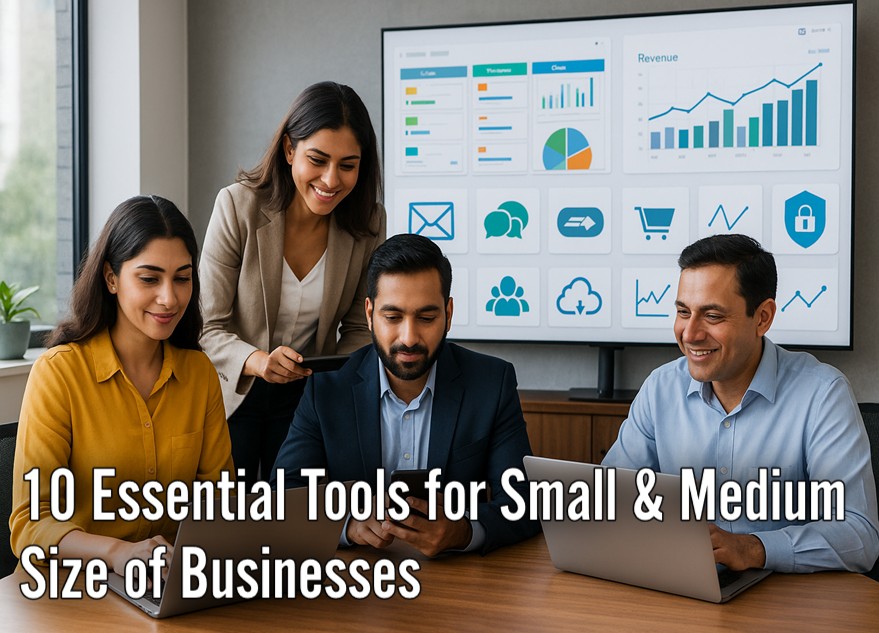Running a small or medium-sized business (SMB) can be challenging, with limited resources and tight budgets. To stay competitive and efficient, it’s crucial to leverage the right tools that streamline operations, boost productivity, and enhance customer engagement. In this blog, we’ll explore 10 essential tools that every SMB should consider to optimize their workflow, manage finances, and grow their business. Whether you’re just starting out or looking to upgrade your current setup, these tools are designed to help you succeed in today’s fast-paced business environment.
💡 Are you looking for Coworking space in Gurgaon, Noida or Delhi? We are just a call away.
Call Now: 08999 828282
10 Essential Tools that Every SMB should Use
- Project Management Software
- Accounting Software
- Customer Relationship Management (CRM) Software
- Email Marketing Tools
- Communication Tools
- E-commerce Platforms
- Social Media Management Tools
- File Storage and Sharing
- Website Analytics Tools
- Security Tools

1. Project Management Software
Project management tools like Trello or Asana are vital for keeping your team organized. They allow you to assign tasks, set deadlines, and track progress in real-time. This ensures that everyone is on the same page, helping your small and medium business stay on track and meet its goals.
2. Accounting Software
Managing finances is crucial for any SMB. Tools like QuickBooks or Xero offer easy-to-use accounting solutions that handle invoicing, expense tracking, and payroll. They help you keep a clear view of your financial health, ensuring that your business remains profitable.
3. Customer Relationship Management (CRM) Software
A CRM tool like HubSpot or Salesforce is essential for managing customer interactions and sales pipelines. It helps your small and medium business keep track of leads, follow up with customers, and close deals more efficiently.
Also Read: The Essence Of A Great AI Solution For SMBs
4. Email Marketing Tools
Email marketing remains one of the most effective ways to reach your audience. Tools like Mailchimp or Constant Contact allow you to create, send, and analyze email campaigns, helping your SMB engage with customers and drive sales.
5. Communication Tools
Effective communication is key to any business’s success. Tools like Slack or Microsoft Teams allow for instant messaging, video calls, and file sharing, making it easier for your team to stay connected and collaborate, regardless of their location.
6. E-commerce Platforms
If your SMB sells products online, an e-commerce platform like Shopify or WooCommerce is essential. These tools make it easy to set up an online store, manage inventory, and process payments, enabling your business to reach a wider audience.
7. Social Media Management Tools
Social media is a powerful tool for brand promotion. Tools like Hootsuite or Buffer help you schedule posts, monitor engagement, and analyze performance across multiple platforms, saving you time and ensuring that your small and medium business stays active on social media.
8. File Storage and Sharing
Cloud storage solutions like Google Drive or Dropbox are essential for storing and sharing documents. They allow your team to access files from anywhere, making collaboration easier and ensuring that important documents are always within reach.
💡 SMBs looking for HR, Marketing, Technology and Funding solutions for their business.
Call Hello Jarvis 994 8000 800
9. Website Analytics Tools
Understanding how visitors interact with your website is crucial for improving user experience and driving conversions. Tools like Google Analytics provide valuable insights into visitor behavior, helping you optimize your website to better serve your customers.
10. Security Tools
Protecting your business from cyber threats is more important than ever. Tools like Norton or McAfee provide essential security features like antivirus protection, firewalls, and data encryption, helping your SMB stay safe online.
Investing in the right tools can make a significant difference in how efficiently your small and medium business operates. By integrating these essential tools into your daily operations, you can streamline processes, improve communication, and ultimately drive growth. Remember, the success of your SMB often depends on the tools you use, so choose wisely! Set your office at The Office Pass (TOP) co-working spaces available in Delhi and NCR. TOP offers all the facilities required by SMEs to run a successful business all under one roof at cost-effective pricing. Contact us for more details at 08999 828282.
FREQUENTLY ASKED QUESTIONS (FAQS):
Question: What are SMB tools?
Answer: SMB tools are software and applications designed specifically to meet the needs of small and medium-sized businesses. These tools help streamline operations, improve productivity, and manage various aspects of the business, such as finance, marketing, customer relations, and project management.
Question: Why are tools essential for small and medium businesses?
Answer: Tools are essential for small and medium businesses because they automate repetitive tasks, reduce manual errors, and provide valuable insights into business operations. By using the right SMB tools, businesses can save time, cut costs, and focus on growth.
Question: What are some of the most popular tools for SMBs?
Answer: Some of the most popular tools for SMBs include accounting software like QuickBooks, project management tools like Trello, customer relationship management (CRM) systems like HubSpot, and marketing automation platforms like Mailchimp. These tools help small and medium businesses operate efficiently.
Question: How can SMB tools help improve productivity?
Answer: SMB tools improve productivity by automating tasks, organizing workflows, and providing easy access to essential information. For example, project management tools can help teams collaborate more effectively, while CRM systems can streamline customer interactions and sales processes.
Question: What should small and medium businesses consider when choosing tools?
Answer: When choosing tools, small and medium businesses should consider their specific needs, budget, and the tool’s ease of use. It’s also important to choose tools that can scale with the business as it grows, ensuring long-term value.
Question: Can SMB tools help in managing finances?
Answer: Yes, SMB tools like accounting software can significantly help in managing finances. These tools allow businesses to track expenses, generate invoices, manage payroll, and even prepare for tax season, ensuring accurate and efficient financial management.
Question: Are there affordable tools available for small and medium businesses?
Answer: Yes, there are many affordable tools available for small and medium businesses. Many SMB tools offer tiered pricing models, including free or low-cost options, making it easier for businesses to start using them without a significant upfront investment.
Question: How do SMB tools support customer relationship management?
Answer: SMB tools support customer relationship management by helping businesses track customer interactions, manage leads, and automate follow-ups. Tools like HubSpot or Zoho CRM provide a centralized platform where all customer data is stored, improving customer service and increasing sales opportunities.
Question: What are the benefits of using marketing tools for small and medium businesses?
Answer: Marketing tools help small and medium businesses create, manage, and analyze marketing campaigns. They can automate email marketing, manage social media, and track campaign performance, making it easier to reach and engage with potential customers.
Question: Can SMB tools be integrated with each other?
Answer: Yes, many SMB tools can be integrated with each other to create a seamless workflow. For instance, CRM tools can be integrated with email marketing platforms, and accounting software can be connected to payment processing systems. These integrations help small and medium businesses operate more efficiently by ensuring that data flows smoothly between different tools.



